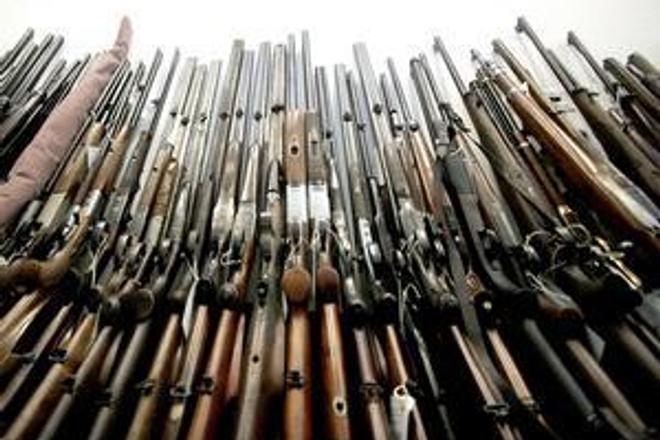Everything was legal, as the old Slovak law on weapons, valid until last summer, did not prevent any foreigner from purchasing these weapons, the British daily Guardian wrote in a story published on April 22.
Though ball cartridges cannot be used in the so-called expansive weapons, professionals operating in the illegal market can turn them into classic, functional weapons again.
The British criminalists tracked the gangsters from Kent who were involved in drug trafficking in the past, since last March, three months after the attack on editorial staff of the satirical magazine Charlie Hebdo in Paris. At the time, the police found re-activated expansive weapons from the shop in Partizánske used by the Paris attackers. The criminalists monitored the gangsters who travelled to Romania, Hungary and the small Slovak village of Zalaba (Nitra Region), about 100 kilometres from Partizánske, the Denník N daily wrote.
Sold legally by AFG Security in Slovakia as deactivated acoustic expansion weapons, they were illegally reactivated by hammering out a metal pin which had been placed in the barrel, transforming them into lethal weapons. The shadowy trade out of western Slovakia is the subject of multiple criminal and anti-terror investigations in Europe, including investigations into the Islamist terrorist attacks in Paris last November that killed 130 people, the Guardian reported.
As for members of the British gang, they tried to smuggle 22 AK-47 Kalashnikovs and nine 61 machine guns (i.e. Scorpions). They were buying the deactivated guns for hundreds of euros a piece but earned allegedly up to a quarter million on their sale. They were caught when putting the load from a boat into a van, Denník N wrote.
Two leading members, Harry Shilling (aged 25) and Michael Defraine (aged 30), “were convicted of smuggling the firearms and conspiracy to possess firearms with intent to endanger life after a trial at the Old Bailey in London. Three other members of the group pleaded guilty to their part in the plot. All five face possible life imprisonment when they are sentenced on 13 May”, according to the British daily.
Through the gang, arms may have been delivered even to some of Islamist terrorists who have been contacting local gangs recently, the Guardian wrote.
Slovak shop involved
The Slovak shop AFG in Partizánske explained for the Slovak daily that they have no reason to prevent anyone from buying their guns; the real issue is where and how the expansive weapons have been re-activated and made functional because this is the illegal part of the story. They refused to talk in detail about whether they remember two British gang members, citing confidentiality and tactfulness usual in the industry.
Slovak police remain tight-lipped
The Slovak Information Service (SIS) did not specify whether it cooperated with British counterpart in investigation, via spokesman Branislav Zvara. The answer leaves such an option open. “Our intelligence service has been dealing with the issue of expansion weapons for a longer time; and thus, we rule out that such a movement of arms as described by you could escape out notice,” he told Denník N. "After the Charlie Hebdo attacks, but also after the November Paris attacks, Slovak police cooperated and further cooperates with its partner organisations abroad,” Police Presidium spokesman Martin Wäldl said. He added, however, that it is not possible to comment further on people and on the contents of information, due to tactical and security reasons.
Since then, Slovak legislation concerning arms has been toughened and is currently among the strictest in Europe. Interior Minister Robert Kaliňák admitted, as quoted by Denník N, that Slovakia used to be the supplier of expansion arms for the whole Europe. Now, even the expansion arms adapted from arms of different categories must be registered; and internet sale of arms, including expansion ones, was re-introduced. In practice this means that Slovaks owning expansion arms must register with the police and foreigners must prove they have a special license to import arms from the respective authorities. The AFG shop assistants commented that since the law is valid, foreigners stopped coming to buy altogether – as it is easier now to buy expansion submachine guns in the Czech Republic or elsewhere.



 Illustrative stock photo (source: SITA)
Illustrative stock photo (source: SITA)